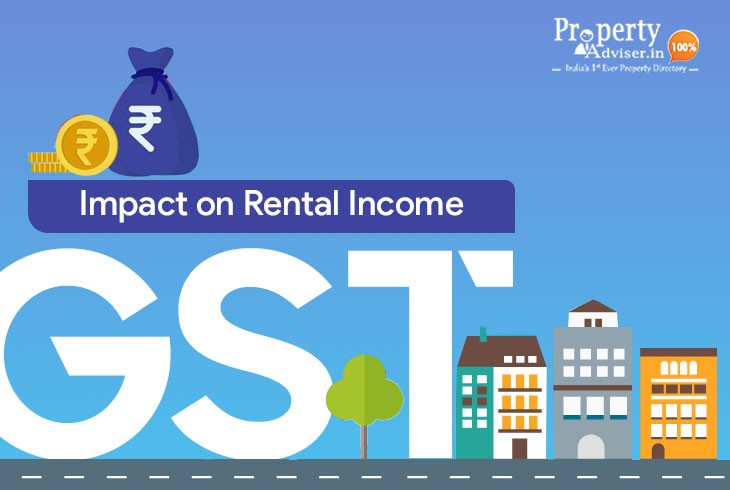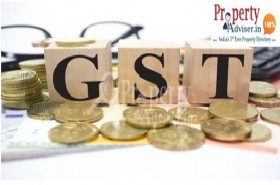when you let out an immovable property, you will receive rent. the rent received is taxable as income (as per the income tax act) if it exceeds the taxable income of the landlord. the implementation of products and services tax (gst) has put down a structured approach to gather taxes from varied sectors.
rent has been the supply of financial gain for several over the years. during this article, allow us to quote the impact of the implementation of gst on rent, which will enable us to additionally see if gst varies for industrial properties and residential properties.
are you paying gst on rental income?
goods and services tax (gst) is applicable from 2017. it replaces many indirect taxes, such as service tax. pre-gst, the owner had to get a service tax registration if his total taxable service (including the income from all properties) exceeds rs. 10 lakhs annually. as long as the income (from all the features that are rented-out) doesn't exceed rs 10 lakhs annually, the owner wouldn't be drawn to service tax.
under the previous tax regime, commercial properties alone that square measure let-out would attract service tax. this is applicable although a residential property is employed for industrial functions. service tax was v-day of the rent for industrial properties. to add, income from residential properties didn't attract service tax
before the implementation of gst,
the landlord who received lease had to pay 15% gst on lease rent of land if he let out the property for commercial purposes.
the rental income from the let out the property exceeds rs 10 lakhs p.a.
gst on renting of immovable property (after implementation of gst),
he lets out the property for commercial purposes. he pays gst @ 18% on commercial rental income if it exceeds rs 20 lakhs per annum.
for example, nitin, who resides in bengaluru, lets out his property in pune for commercial purposes for rs 2 lakhs per annum.
as nitin’s rental income is less than rs 20 lakhs, he need not pay gst on rent.
however, if nitin was earning a rent of rs 2 lakhs per month, his yearly rental income exceeds rs 20 lakhs. therefore, he has to pay gst @ 18% on his rental income of rs 24 lakhs.
the place of supply is pune (which is the location of the immovable property).
when do you pay gst?
according to the act, gst on renting of immovable property would be treated as a source of services. gst, however, applies solely to sure varieties of rent such as:
when a property is given out on lease, rent, easement, or accredited to occupy or when any property is hired out (or let out) together with an ad, industrial, or residential property for business (either partially or wholly). this form of rental is taken into account as a provider of services and so would attract tax.
the gst on rent paid if:
-
you rent out the property for commercial use.
-
you let out the residential property for commercial use. for example, you have to pay gst on your residential property if it is let out to a company as a guest house.
-
the rental income exceeds rs 20 lakhs per annum.
when you lease out a residential property for residential purposes, it's exempt from gst. the other form of lease or rental out of the immobile property for business would attract gst at 18 because it would be treated as a source of service.
after gst was enforced, the brink limit for relevancy of gst on rental income has been multiplied to rs.20 lakh from rs.10 lakh that was within the pre-gst era. this makes several landlords – who were earlier lined underneath the service tax regime to be relaxed currently up to a different rs.10 lakhs earned.
who has to pay the gst?
the landlord collects from the tenant and pays gst if the above conditions are satisfied. he has to register under gst and pay taxes periodically. a remunerator earning quite the exempted threshold is needed to register underneath gst and pay taxes. so, if you have got given your property to businesses, then it's assessable if you're obtaining quite rs 20 lakhs as rent and you'll need to register yourself underneath gst.
how much should you pay?
in case a residential property is rented out, there'll be no gst on it. the other quite dealings, like industrial, would attract gst at the speed of 18 % as letting-out a property would be treated as an offer of service.
if the income is quite rs 20 lakh every year, then the owner, which can be any entity like firms, can take registration with gst network (gstn) and pay the gst on the income. before gst came into the result, the brink limit was rs 10 lakh. once gst has been introduced, an equivalent limit has been unbroken at rs 20 lakh. this implies that the landlords have a leeway of rs 10 lakh beneath the gst regime.
the gst rate has been unbroken at 18% for an industrial property on the nonexempt worth, wherever the leasing activity would be thought of cherish offer of services. however, this rule won't apply to charitable or non-secular trusts that own and manage a holy place being employed by folk. however this exemption can apply solely in cases wherever the rent of the rooms is a smaller amount than rs 1000/day, the rent of outlets meant for business purpose is up to rs 10,000/month and in cases wherever the community hall is let loose for up to rs 10,000/day.
if you let out your property for commercial purposes and all the other conditions given above are met, you pay gst @ 18% p.a. on rental income.
gst is exempt if:
you let out the property for residential purposes.
if a registered charitable or religious trust owns and lets out an immovable property for religious functions if:
the rent for the room is less than rs 1000 per day.
the rent of shops and other commercial spaces is less than rs 10000 per month.
the rent of the function hall or open area is less than rs 10000 per day.
how gst will affect the tax levied on properties?
to compute gst on rental income, let’s look at an example:
kavya living in hyderabad is the landlord of a property in bengaluru that she has let out to alka to run a boutique for a monthly rent of rs 3,00,000. alka has to pay kavya the monthly rent plus gst @ 18%. kavya will deposit the amount collected as gst to the government.
alka pays kavya annual rent = rs 36,00,000
(add) gst @ 18% (gst on rent paid)= rs 6,48,000
total amount = rs 42,48,000
kavya must deposit rs 6,48,000 as igst. (if both kavya and alka are in the same place or kavya and the property is in the same place, gst split into cgst + sgst).
for more details about gst filing, get in touch with your chartered accountant.
alka can claim input tax credit (itc) on gst paid to kavya. an input tax credit is the credit for tax paid and can be adjusted while paying other tax dues.
kavya must file the gst returns and deposit the gst amount collected from alka as per the gst returns filing schedule.
gst’s impact on home loans
a processing fee is collected whenever you apply for a loan. the processing fee is calculated as a percent of the loan amount (it ranges from 0.25% to 1%) plus applicable taxes/gst. the loan applicant must pay gst @ 18% on the processing fee.
for example, if you want to take a loan of rs 25 lakhs, a processing fee @ 0.5% plus gst = 12500 + 2250 = 14750.
and, if you want to pre-pay a fixed rate home loan, the issuing bank charges 2% to 3% of the principal amount outstanding as prepayment charges plus gst @ 18% on it.
for example, if the principal outstanding is rs 10 lakhs, the prepayment charge @ 2% plus gst = 20000 + 3600= 23600
visit https://propertyadviser.in to know more about the real estate sector.
by: lotus tech & govi















